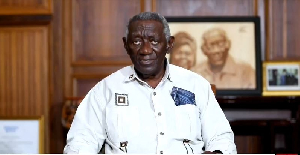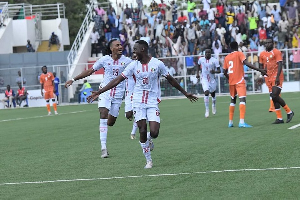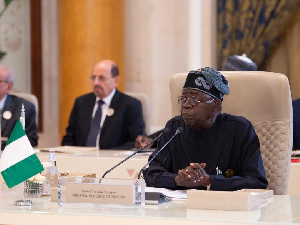Accra, May 19, GNA - Professor S. K. Adjepong, Chairman of the National African Peer Review Mechanism - Governing Council (NAPRM-GC) on Tuesday described Ghana as a trailblazer in Africa's quest to entrench the tenets of democracy and good political governance. "Ghana's records of achievement through the peer review mechanism process within a period of four years - 2002 to 2006, establishment of structures, and instituting measures for the implementation of the review recommendations are experiences worth sharing.
"The nation's technical know-how gathered over the period, achievement and challenges must be shared with other countries that are currently going through the process," Prof Adjepong stated during an interaction with a three-member NAPRM-GC team from Sierra Leone. The team headed by Dr. Osman Gbla, the Chairman, Mr Festus E. Minoh and Mr Mohamed Jolloh was in the country to understudy Ghana's process for establishing the national structures, fund raising strategy, communication and sensitization and how to deal with the country support and review missions.
Other issues to be discussed are dealing with international actors, Ghana's review process, preparation of the country self assessment report, issue paper and the national programme of action, and the post APRM review phase.
Prof. Adjepong, flanked by Prof. Miranda Greenstreet, Prof S. K. B. Asante all members of the Ghana NAPRM-GC and Dr Francis Appiah, Executive Secretary said Ghana had opened its doors to Togo, Benin, Ethiopia, South Africa, Burkina Faso, and Nigeria. The NAPRM-GC Chairman said 28 African Countries have so far acceded to the review mechanism out of which nine have been reviewed and 15 have signed the Memorandum of Understanding.
He attributed the slow pace of implementation of the process to poor coordination from African Peer Review Secretariat and the APRM Eminent Panels.
Prof. Adjepong said, "these two bodies have failed to pay regular visit to countries that had acceded to explain the process of implementation, set-out guidelines for the whole process, a situation which over the years had slowed down the process". Dr. Gbla noted that Sierra Leone acceded to the process in 2004 but was slowed down by the post war syndrome; the fragile transitional movement within the body politicks of the nation, and funding hiccups. He said since 2008, the new government had demonstrated political commitment which had speeded up the process of implementation. On the independence of the Governing Council, Dr Gbla said the composition of the 22-Member Council made it difficult for governmental manipulation.
The Council is made up of non-state actors who formed the majority, Representatives of Ministries, Minister of the Presidency which serves as a focal person with other social and civil actors. The African Peer Review Mechanism (APRM) is an instrument voluntarily acceded to by Member States of the African Union as an African self-monitoring mechanism.
The mandate of the African Peer Review Mechanism is to ensure that the policies and practices of participating states conform to the agreed political, economic and corporate governance values, codes and standards contained in the Declaration on Democracy, Political, Economic and Corporate Governance.
The APRM is the mutually agreed instrument for self-monitoring by the participating member governments to foster the adoption of policies, standards and practices that lead to political stability, high economic growth, sustainable development and accelerated sub-regional and continental economic integration through sharing of experiences and reinforcement of successful and best practice, including identifying deficiencies and assessing the needs for capacity building.
Business News of Tuesday, 19 May 2009
Source: GNA
















